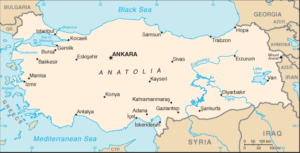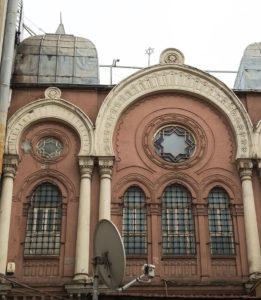 Even prior to the Ottoman Empire in the 14th century Jews were present, particularly among the Greek-speaking Romaniots. Over time, around 60,000 Jews exiled that year by Ferdinand and Isabella of Spain came to live in lands of the Ottoman Empire.
Even prior to the Ottoman Empire in the 14th century Jews were present, particularly among the Greek-speaking Romaniots. Over time, around 60,000 Jews exiled that year by Ferdinand and Isabella of Spain came to live in lands of the Ottoman Empire.
Between the late fifteenth and sixteenth centuries Jews arrived from Spain, Italy, and Portugal, and established or joined thriving communities, particularly in Istanbul and Salonika. Istanbul, then called Constantinople, was a haven for Jews, who made up 10% of the city’s population.
 The history of the Ottoman Jews is rich with mutual complementary cultural influences. The Jews coming from Spain established the first printing presses and many Jewish doctors served in the courts of Ottoman sultans and in the Ottoman army. Religious freedom allowed the flourishing of famous rabbis that produced outstanding works of comments on the Old Testament.
The history of the Ottoman Jews is rich with mutual complementary cultural influences. The Jews coming from Spain established the first printing presses and many Jewish doctors served in the courts of Ottoman sultans and in the Ottoman army. Religious freedom allowed the flourishing of famous rabbis that produced outstanding works of comments on the Old Testament.
Jews engaged in commerce enhanced trade between countries of the region for the benefit of all. By the late 19th century, 300,000-450,000 Jews resided in the Ottoman Empire, though conditions had begun to change. The economic crisis triggered by Europe’s discovery of the Americas had a major impact on Jewish merchants, particularly as longstanding Ottoman trade routes shifted in the Europeans’ favour. Europeans working with the Empire preferred Christians as middle men rather than Jews. This led to emigration.
 By 1914 WWI started with the Ottoman Empire on the Axis side, losing the world war. The war ended in 1917 and the empire disintegrated. The Turks attempted to forge a specific national identity, regarding minorities with suspicion. The new republican political system, directly inspired by the Jacobin model, had a major effect on the living conditions of the Jewish community.
By 1914 WWI started with the Ottoman Empire on the Axis side, losing the world war. The war ended in 1917 and the empire disintegrated. The Turks attempted to forge a specific national identity, regarding minorities with suspicion. The new republican political system, directly inspired by the Jacobin model, had a major effect on the living conditions of the Jewish community.
The new republic was above all determined to encourage the formation of a national middle class. The Universal Israelite Alliance schools were forced to break their foreign ties, and Turkish was made the only language of instruction. Ladino, the lingua franca of Jews was banned and Jewish community schools were closed.
The Jews of Eastern Thrace were targeted by pogroms from June 21-July 4, 1934. These began with a boycott of Jewish businesses, and were followed by physical attacks on Jewish-owned buildings, which were first looted, then set on fire. Jewish men were beaten, and some Jewish women reportedly raped. Terrorized by this turn of events, more than 15,000 Jews fled the region.
 There was a discriminatory policy toward minority populations in Turkey, which intensified during the Second World War. In 1942 an “exceptional tax” was imposed, conceived to bring about the economic ruin of its minority populations. People were divided into four groups (foreign residents, non-Muslims, Muslims, deunmés) and taxed accordingly. The official estimate of individual means was most often completely arbitrary. The tax was 5% for Muslims and 150-200% for Greeks, Armenians, and Jews. Most had no way to pay such exorbitant taxes and were forced to sell their belongings. Those unable to pay were then condemned to work camps in the far reaches of Anatolia. The tax was finally abolished in March 1944, but as a result of this another 30,000 Jews emigrated.
There was a discriminatory policy toward minority populations in Turkey, which intensified during the Second World War. In 1942 an “exceptional tax” was imposed, conceived to bring about the economic ruin of its minority populations. People were divided into four groups (foreign residents, non-Muslims, Muslims, deunmés) and taxed accordingly. The official estimate of individual means was most often completely arbitrary. The tax was 5% for Muslims and 150-200% for Greeks, Armenians, and Jews. Most had no way to pay such exorbitant taxes and were forced to sell their belongings. Those unable to pay were then condemned to work camps in the far reaches of Anatolia. The tax was finally abolished in March 1944, but as a result of this another 30,000 Jews emigrated.
A number of factors led the way for a massive emigration to Israel beginning in 1948 and continuing during the years 1950-60. In September 1955, an Istanbul Pogrom was unleashed. Although primarily aimed at the city’s Greek population, the Jewish and Armenian communities of Istanbul were also targeted. The damage caused a total of over than 4,000 shops and 1,000 houses belonging to Greeks, Armenians and Jews to be destroyed. This deeply shocked minorities throughout the country, leading to further emigration. After World War II, while the British rule tried to prevent the movement of the Jewish refugees into Israel, the modern day Turkish republic allowed its Jewish citizens freely to emigrate to Israel.
 Selahattin Ulkumen, a Turkish diplomat saved Jews on the Nazi-occupied island of Rhodes from being sent to concentration camps during World War II. In July 1944, he issued exit visas to Turkish Jews living on the island and their non-Turkish children and spouses. Forty-two Jewish families were spared. His house in Rhodes was bombed in retaliation, and his pregnant wife later died from injuries.
Selahattin Ulkumen, a Turkish diplomat saved Jews on the Nazi-occupied island of Rhodes from being sent to concentration camps during World War II. In July 1944, he issued exit visas to Turkish Jews living on the island and their non-Turkish children and spouses. Forty-two Jewish families were spared. His house in Rhodes was bombed in retaliation, and his pregnant wife later died from injuries.
Over the years there has been an escalation of antisemitism in Turkey. In 2003, an Istanbul dentist was murdered in his clinic out of antisemitic sentiment. In 2009, a number of Jewish students suffered verbal abuse and physical attacks, and a Jewish soldier in the Turkish Army was assaulted. The Neve Shalom Synagogue in Istanbul was attacked three times. On 6 September 1986, Arab terrorists gunned down 22 Jewish worshippers and wounded 6 during Shabbat services at Neve Shalom. The Synagogue was hit again during the 2003 Istanbul bombings alongside the Beth Israel Synagogue, killing 20 and injuring over 300 people.
After the election of Tayyip Erdogan as the Prime Minister, Turkish government has changed its policy, turning against Israel and aligning itself with Iran and radical Arab regimes, including terrorist organization Hamas. Erdogan has been erasing the reforms of Ataturk, the founding father of modern Turkey. Under Erdogan, Turkey has become an islamist country, where the Jewish minority lives in fear.
In 2010, Israel prevented six civilian ships of the Gaza Freedom Flotilla in international waters in the Mediterranean Sea. Nine activists were killed in the raid. As a result Turkey withdrew its ambassador and ejected Israel’s. In 2012, it was reported that the number of Jews expressing interest in moving to Israel rose by 100%, a large number of Jewish business owners were seeking to relocate their businesses to Israel, and that hundreds were moving every year. Today, only about 17,000 Jews live in Turkey, most of them in Istanbul.